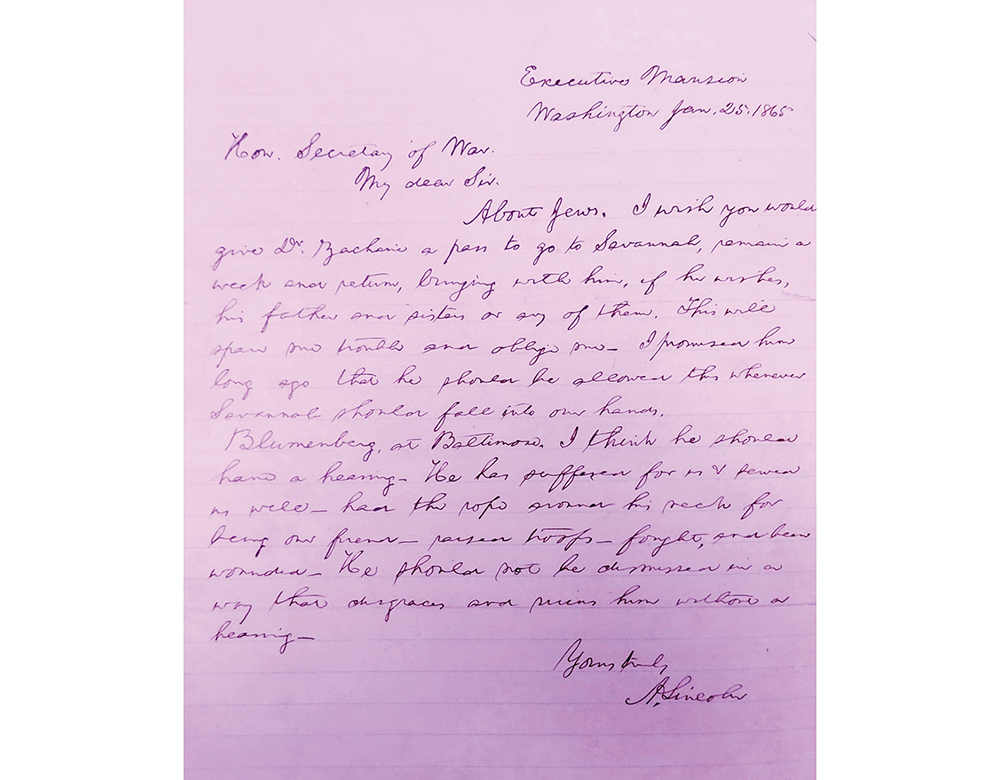
Abraham Lincoln was the 16th president of the United States. He is most often mentioned in reference to the Union effort to win the Civil War and as the man most responsible for ending slavery in America. Lincoln was famous in his day for being tall, for wearing a stove top hat and for growing a beard in response to a letter from 11-year-old Grace Bedell. Bedell suggested that Lincoln might appear more electable if he grew whiskers.
What is practically unknown about Lincoln are his Jewish connections. He was the first U.S. president to allow a Jewish chaplain to be appointed to the U.S. Army. The law in 1861 said that an army chaplain had to be a Christian. The Pennsylvania 5th Cavalry regiment appointed Rabbi Dr. Arnold Fischel their chaplain and the War Department rejected the nomination. In December 1861, Rabbi Fischel was granted an audience with Lincoln. Lincoln promised Rabbi Fischel that he would speak to Congress about what is “desired by you on behalf of the Israelites.” On July 17, 1862, Lincoln signed the amending legislation into law, allowing ministers of a “religious congregation” to become chaplains. Lincoln did more than listen to Rabbi Fischel; the president stood up for American Jews by taking on the U.S. Army and the U.S. Congress.
Lincoln’s concern for the Jews was personal. “I myself have a regard for the Jews. My chiropodist is a Jew, and he has so many times ‘put me on my feet’ that I would have no objection to giving his countrymen a ‘leg up.’”
Lincoln’s Jewish doctor was Issachar Zacharie and he became one of the president’s closest friends. Lincoln trusted Zacharie enough to send him south on peace missions during the Civil War.
Lincoln had grown up reading the Old Testament, as he called it, and spoke of “God’s will” in his second inaugural speech. He was familiar with the Passover story and the Jews’ exodus from Egypt. Lincoln used the Gettysburg Address to speak about “a new birth of freedom.”
To Lincoln, slavery was a moral issue. While he had not gone to war to end slavery, as most of us were taught—he went to war to stop the rebellion—Lincoln used the Union victory at Gettysburg, Pennsylvania as an opportunity to pivot the nation’s focus from “preserving the Union” to ending slavery in America.
Lincoln was the first U.S. president to refer to Jews as “a class of people” when General Ulysses S. Grant issued his controversial General Order No. 11, expelling the Jews from a territory under U.S. Army control. Grant was not an antisemite. He was just ill-informed and spent the remainder of his life trying to make amends for his actions. Lincoln understood this, and he understood that as president he had to stop antisemitism where it began.
While the Jewish presence in America dates back to the birth of America with such men as Haym Solomon, who was the prime financier of the colonists’ side during the Revolutionary War, most of us trace our family’s arrival in “the New World” to the 1880s and 1890s from the pogrom-riddled Eastern Europe. By the time of Lincoln’s election in 1860 there were Jews living in Cincinnati, in Chicago, in Baltimore, in New York and, yes, in the southern states of the Confederacy. It is estimated that over 200,000 Jews lived in the United States by the time Abraham Lincoln became president on March 4, 1861. Purim that year was on Motzei Shabbat, March 23, just as it was this year. Lincoln referenced Haman in a letter to a friend in 1855, writing that in passing a law “to hang men who shall venture to inform a [black person] of his legal rights,” the Kansas legislature might, “like Haman … hang upon the gallows of their own building.”
In addition to “slavery,” Lincoln was connected to the Jews and to Passover in another way. Just as we will start Passover this year on Monday night, so too did American Jews in April 1865. Lincoln went to Ford’s Theater in Washington D.C. on Thursday night, Chol Hamoed Passover, and was shot by John Wilkes Booth. The president died the next morning, on Friday, April 15. Many New York Jews heard the news for the first time in shul, on Shabbat Chol Hamoed Passover, when their rabbis inserted Lincoln into their sermons. In response, many congregations included the fallen president in their recitation of the Mourner’s Kaddish.
On the day that he died, Lincoln told his wife, Mary, that he wanted to travel to Jerusalem after the war was over. He had been connected to Jews from the moment he learned to read until the day he died.
David Roher is a USAT certified triathlon and marathon coach. He is a multi-Ironman finisher and veteran special education teacher. He is on Instagram @David Roher140.6.
He can be reached at [email protected].












